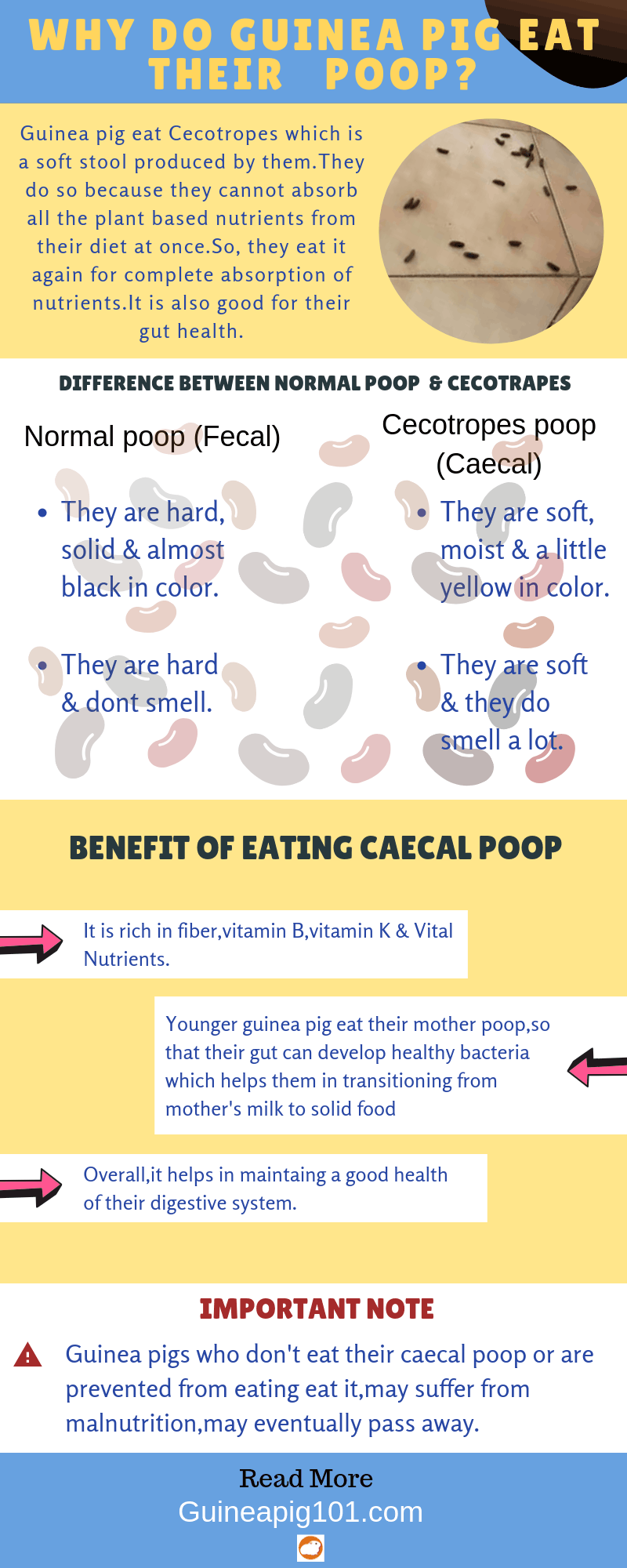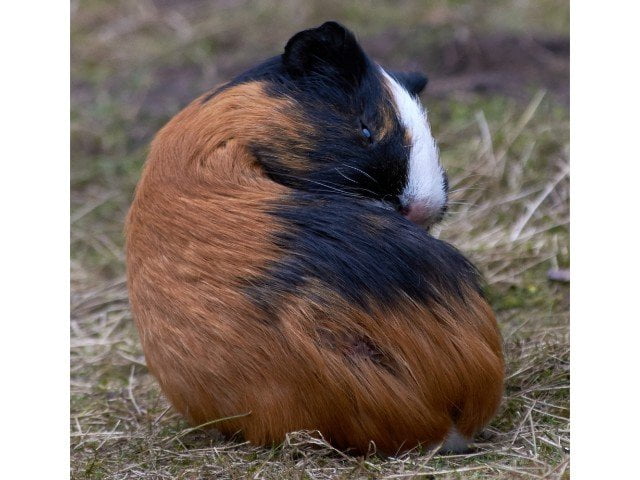It might sound gross to some people, but guinea pigs do eat their own poop. But would they do so? Why do guinea pigs eat their poop? As a curious guinea pig owner, I decided to do some research and what I found was something I had never heard of.
Guinea pigs eat cecotropes, which is a soft stool produced by them. Eating these has various benefits, while for an adult, it helps in the absorption of extra nutrients from it; for young ones, it acts as a starter for good bacteria in their gut before they switch from their mother’s milk to solid foods.
Guinea pigs in the wild didn’t have an abundance of food with them. So, they developed a habit of absorbing the leftover nutrients by consuming their poop. But what they eat is not precisely their regular poop but cecotropes. In fact, it is very unlikely for a guinea pig to eat their regular poop.
Guinea pigs typically have two types of poop. One is fecal poop, which is hard and black in color. The other one is called caecal poop, which is soft and yellowish in color and usually is covered in some sort of mucus.
Let us dive deep and learn a little more in detail to understand what exactly is cecotropes, how is it different from regular poop and why do guinea pigs eat it?
Guinea pig Cecotropes
First, let us begin by understanding what exactly Cecotropes is? Cecotropes are soft, nutritious substances produced by the guinea pigs.
Although many people confuse it with poop as both come out from the same spot, it’s not precisely a poop. Then what is it? To understand that the first thing you need to understand is how it is formed.
The process is a little complicated one, but I have simplified the terms so that you can understand it pretty quickly. So, let’s find out!

As guinea pigs eat their food, the food passed through the esophagus and reaches the intestines. Here the walls of intestines break the food partially which is again pushed towards a pouch called cecum.
Here the good bacteria of the gut further breaks the food down into simple sugar form, which is absorbed by the cell in the form of energy. What remains is soft, moist pellets known as cecotropes.
These pellets still hold lots of nutrients because the bacteria are still unable to extract all the proteins and Vitamins from the food. However, these pellets continue their journey through the intestines and out to the world where guinea pigs are ready to gulp them back in.
When our guinea pigs eat it again and pass it through their intestines and re-process the food, the food breaks down completely, allowing the guinea pigs to rip all the nutrition out of it.
These cecotropes are full of Vitamins and Minerals which guinea pigs need for living healthy. If a guinea pig is prevented from eating cecotropes or is by any means unable to eat it, then they will suffer from malnutrition and may eventually pass away due to the same.
The entire process of producing cecotropes and eating it is referred to as guinea pig coprophagy.
Since guinea pigs are herbivores and they eat a plant-based diet that has a lot of fiber in it, the food doesn’t get entirely digested at once. So to rip all the nutrients out of the food, they need to ingest the food again. I hope the next time you see that you will not feel gross again!
Is it normal for a guinea pig to eat its poop?
Yes, it is entirely natural for guinea pigs to eat their caecal poop. Guinea pigs need to eat their caecal poop to get essential Vitamins from it.
Also, it is commonly seen that if one of your guinea pigs is ill, then they will look for caecal poop of the healthy guinea pigs to eat it.
Studies claim that eating the poop of healthy guinea pigs helps them in recovering rapidly.
Do all guinea pigs eat their poop?
Yes, In general, all guinea pigs will eat their Caelcal poop. In fact, it could be a problem if they are not eating it. As they can suffer from serious health diseases and malnutrition. Some of the common benefits of eating their caecal poop are:
Provides essential nutrients: Caecal poop is rich in Vitamin K and Vitamin B complex. It also contains some protein and other nutrients which are vital for guinea pigs. When they reprocess it, their body absorbs all the nutrients quite well, which keeps your guinea pigs healthy.
Improves digestive health: Caecal poop is also rich in fiber, which is essential for guinea pigs. Consuming caecal poop aids in digestion and bowel movement as it contains a lot more fiber in it.
How often do guinea pigs eat poop?
Guinea pigs will eat their poop very often. As guinea pigs have a quick digestive cycle(metabolism), they will often produce caecal poop. And you will see them gulp it down as soon as it comes out.
So, if you ever notice your guinea pigs chewing something after cleaning their rear, then you can guess already what they might be eating on.
What does it mean when guinea pigs don’t eat their poop?
There can be some situations when guinea pigs are unable to consume their caecal poop. Older guinea pigs often lose their muscle tone near their anal area, which can lead to impaction in them.
In such circumstances, guinea pigs are unable to excrete their poop and Cecotropes, which can be an emergency. If such a situation arises, you must rush your guinea pigs immediately to a vet.
The vet might need to manually clean and remove the excreta out. In the meantime, you must supplement your guinea pig’s diet to prevent malnutrition. Your doctor may recommend some vitamin supplements along with toasted wheat germ.
Conclusion?
Do guinea pigs eat their poop? Yes, guinea pigs do eat their caecal poop as it contains lots of essential vitamins and minerals which they could not ingest when they first consumed the food.
So reprocessing the food often helps in absorbing all the extra vitamins and minerals from the poop. Yes, it might sound a little gross to you, but doing so is vital for your guinea pigs.
If your guinea pigs don’t consume the poop, then they may get malnourished and may even pass away. So it is an essential part of their life.
Sources: Pet coach, LiveScience, Wikipedia
Similar Posts:
- What Should Guinea Pig Poop Look Like? (Normal & Abnormal Poop)
- Guinea Pig Vegetables List: 70+ Safe & Unsafe Veggies With Feeding Tips
- How To Treat Guinea Pig Constipation? (Causes & +What To Do)
- What Fruits Can Guinea Pigs Eat? (Fruit List, Serving Size & More)
- Do Guinea Pigs Attract Rats? (Why & How To Get Rid Of Them)
